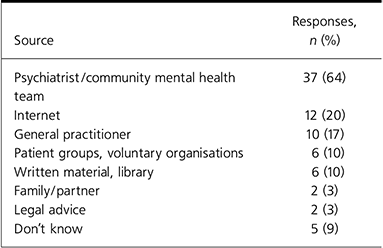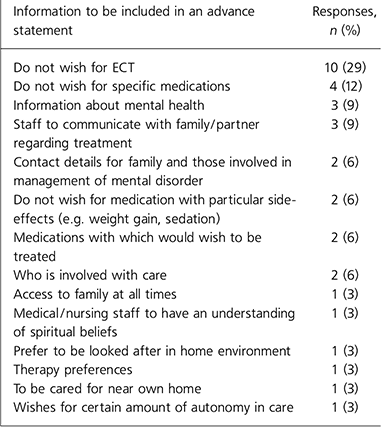The Mental Health (Care and Treatment) (Scotland) Act 2003 incorporated a number of provisions relating to the principle of patient participation, including named persons, access to advocacy, and advance statements. The majority of the Act's provisions were implemented on 5 October 2005, but advance statements and named persons were introduced a year earlier.
An advance statement is:
‘a written statement setting out how they [the patient] would wish to be treated, or wish not to be treated, for a mental disorder should their ability to make decisions about treatment for their mental disorder become significantly impaired as a result of their mental disorder’.
The value of advance statements has been debated. Papageorgiou et al (Reference PAPAGEORGIOU, KING and JANMOHAMED2002) carried out a randomised controlled trial looking at the effect advance statements had on future hospitalisation and found no difference in the rates of either compulsory or voluntary readmissions, the number of days spent in hospital or satisfaction with psychiatric services. However, Henderson et al (Reference HENDERSON, FLOOD and LEESE2004) conducted a randomised controlled trial of joint crises plans (a form of advance agreement) and found reduced use of the Mental Health Act 1983 and reduced admissions in the intervention group. Mental health charities such as Mind (http://www.mind.org.uk) have campaigned for the introduction of legally enforceable advance statements enabling patients to plan their treatment with the aim of enhancing autonomy and engagement with services.
The uptake of the advance statement facility appears to have been low thus far. The Mental Welfare Commission (2006) Quarterly Statistics (January to March 2006) have records of only 42 advance statements. This may be a conservative figure given that the Mental Welfare Commission is not routinely informed when an advance statement is made.
Psychiatric services have a duty to ensure, as far as is practicable, that patients are aware of their rights. By the time of our study advance statements had been in place for 14 months and we wanted to identify levels of awareness, understanding and opinions both before and after participants were given information about the process.
Method
Participants were recruited from the Lithium Clinic at Dykebar Hospital, Paisley over a 6-month period from December 2005. This gave us a sample with severe and enduring mental illness but with good insight and functioning between episodes. Many had been hospitalised previously, a significant number on an involuntary basis. Of those who attend the Lithium Clinic 60% have a diagnosis of bipolar affective disorder, 25% recurrent depressive disorder and 15% other diagnoses, including affective psychosis and personality disorder. Consecutive clinic attenders were asked to participate in the study. Participants were given written information explaining the format, purpose and lack of obligation to take part. Questionnaires were completed anonymously.
Two questionnaires were given to patients. The first asked the following questions:
-
• have you heard of advance statements?
-
• if so, what do you understand them to be?
-
• what might you like to include in an advance statement?
-
• if you wanted to find out more about advance statements or make an advance statement what sources of information would you use and whom would you talk to?
After completion, a copy of the booklet A Guide to Advance Statements (Scottish Executive, 2005) was issued. At their next clinic appointment, usually within 3 months, participants were given the second questionnaire which asked the following questions:
-
• did you read the information provided about advance statements?
-
• if no, was there a specific reason for not doing so?
-
• if you did read it, what do you now understand advance statements to be?
-
• would you now consider having an advance statement?
-
• if no, is there any particular reason for this?
-
• if you would consider having an advance statement, what information would you want to include in it?
-
• who do you plan to speak to about having it drawn up?
Results
A total of 108 patients attended the Lithium Clinic over a 6-month period (December 2005 to June 2006). Fifty-eight (53.7%) agreed to participate and completed the first questionnaire. Of this sample 62% were female and 38% male and the median age was 55 years (range 35-79, interquartile range 49-63). The gender distribution was in keeping with the original clinic population but the age distribution slightly younger (median 59 years, range 35-86, interquartile range 50-67).
Questionnaire 1
Only 5 of the 58 who participated (8.6%) had heard of advance statements. Of those, only 2 appeared to have a reasonable understanding of the concept, the responses being:
-
• ‘these are statements that the patient makes when entering hospital about the treatment they will receive, e.g. if someone does not wish to receive electroconvulsive therapy (ECT) treatment’
-
• ‘making clear in writing (legal statement) how one wants to be treated regarding medication, hospital care etc.’
-
• ‘not sure’
-
• ‘making arrangements to have someone of your choice deal with your affairs should you become ill, this is done before you are ill’
-
• ‘patients giving information about their illnesses’.
With regards to sources patients would use to obtain information about advance statements a variety of answers were given, many suggesting more than one source (Table 1).
Table 1. Sources that participants would use to obtain information regarding advance statements (n=58)

| Source | Responses, n (%) |
|---|---|
| Psychiatrist/community mental health team | 37 (64) |
| Internet | 12 (20) |
| General practitioner | 10 (17) |
| Patient groups, voluntary organisations | 6 (10) |
| Written material, library | 6 (10) |
| Family/partner | 2 (3) |
| Legal advice | 2 (3) |
| Don't know | 5 (9) |
Questionnaire 2
Out of the 58 participants who completed the first questionnaire 34 also completed part 2 of the survey but only 27 (46%) had actually read the information provided. The main reasons for non-completion of the second questionnaire were non-attendance at clinic, admission to hospital, declined and failure to return forms. The main reason for not reading the booklet was forgetting to do so.
What do you now understand advance statements to be?
It appeared that 16 out of 27 participants (59%) had a definite understanding and 41% (11 of 27) did not grasp the concept fully or gave too vague a response, such as:
-
• ‘future requirements in improvements of treatment’
-
• ‘writing a statement regarding going into hospital’
-
• ‘what your mental state is when normal to act as a reference for when you are ill’.
Answers which demonstrated an adequate understanding included:
-
• ‘an opportunity (enforced by law) to make your wishes known regarding your treatment’
-
• ‘written statement made while you are well which indicates which treatment you would/would not like were you ever to become very unwell in the future’
-
• ‘in the event of becoming ill and admitted to hospital - making your treatment wishes known in advance, e.g. no ECT’
-
• ‘a guide to help my treatment when I am not so well and my mind may be not as balanced in making decisions, e.g. mania influencing buying what you cannot afford’
-
• ‘a statement giving my wishes for treatment if I become too ill to make decisions’.
Would you now consider having an advance statement?
Of those who had read the booklet, 19 (70%) said they would now consider drawing up an advance statement, 6 (22%) would not and 2 (7%) were unsure.
The reasons given for not drawing up an advance statement included:
-
• unable to think of anything to put in an advance statement
-
• it can be overridden by medical staff
-
• put off by the legal aspects
-
• doesn't see it as applicable since always adheres to medication and/or mental state stable for a number of years
-
• ‘don't know how I am when ill’.
What information would you want to include in an advance statement?
Most of the responses related to medication and treatment, in particular ECT. Some had not fully understood the type of information an advance statement should include, for example responding with descriptions of their mental disorder or mental state when well (Table 2).
Table 2. Information participants would include in an advance statement (n=34)

| Information to be included in an advance statement | Responses, n (%) |
|---|---|
| Do not wish for ECT | 10 (29) |
| Do not wish for specific medications | 4 (12) |
| Information about mental health | 3 (9) |
| Staff to communicate with family/partner regarding treatment | 3 (9) |
| Contact details for family and those involved in management of mental disorder | 2 (6) |
| Do not wish for medication with particular side-effects (e.g. weight gain, sedation) | 2 (6) |
| Medications with which would wish to be treated | 2 (6) |
| Who is involved with care | 2 (6) |
| Access to family at all times | 1 (3) |
| Medical/nursing staff to have an understanding of spiritual beliefs | 1 (3) |
| Prefer to be looked after in home environment | 1 (3) |
| Therapy preferences | 1 (3) |
| To be cared for near own home | 1 (3) |
| Wishes for certain amount of autonomy in care | 1 (3) |
Who would you plan to speak to about having an advance statement drawn up?
The majority of answers included psychiatrist or general practitioner (11) but also family or partner (5), community psychiatric nurse or keyworker (3), solicitor (1) and religious superiors (1) were mentioned.
Discussion
From our study it would appear that most patients are unaware of the existence of advance statements. When provided with information, awareness, understanding and interest increased significantly and many participants would now consider taking up the facility. These findings are in keeping with a US study by Swanson et al (Reference SWANSON, SWARTZ and FERRON2006), which found that less than 13% of patients had a psychiatric advance directive but more than 70% expressed a wish to complete one.
Electroconvulsive therapy was the most commonly mentioned treatment that patients did not wish to be administered. This is notable given that under the Mental Health (Care and Treatment) (Scotland) Act 2003, ECT cannot be given if the patient has the capacity to consent but does not agree. The other main area where patients specified preferences related to maintaining their autonomy, such as having a say in the location of their treatment, those involved in their care and communication with family. The majority of participants would look to mental health professionals for advice regarding drawing up an advance statement, therefore we should familiarise ourselves fully with the process.
In summary, advance statements are a new facility within the new Mental Health (Care and Treatment) (Scotland) (2003) Act which were included in order to give patients increased say in their management and treatment. They may also lead to improved therapeutic relationships with mental health services. In this study we were able to demonstrate that an initial lack of awareness and understanding was greatly improved by a straight-forward intervention. This suggests that if we draw patients’ attention to the existence of advance statements when they are well uptake could improve significantly.
Declaration of interest
None.
Acknowledgements
We thank Dr N. Walker, Consultant Psychiatrist, Inverclyde Royal Hospital, Greenock for his help with this paper.





eLetters
No eLetters have been published for this article.